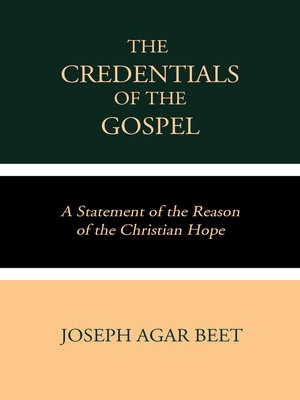The Credentials of the Gospel
ebook ∣ A Statement of the Reason of the Christian Hope
By Joseph Agar Beet

Sign up to save your library
With an OverDrive account, you can save your favorite libraries for at-a-glance information about availability. Find out more about OverDrive accounts.
Find this title in Libby, the library reading app by OverDrive.



Search for a digital library with this title
Title found at these libraries:
| Library Name | Distance |
|---|---|
| Loading... |
THE following lecture differs somewhat from other statements of the evidences of Christianity by its fuller exposition of the contents of the Gospel of Christ as the matter to be proved. It thus encroaches upon the domain of Systematic Theology. But this encroachment was to me inevitable. For the peculiar contents of the Gospel make needful peculiar attestation. Consequently, according to our conception of the Gospel will be our demand for proof that it is true and our estimate of the validity of such proof.
This exposition of the contents of the Gospel has enabled me to show the bearing of its credentials upon Christian life and especially upon personal assurance of salvation.
I have also endeavoured to distinguish between proof that the Gospel is true, which is the aim of this lecture, and the Authority of Holy Scripture, which is not needful to my argument and with which I have not attempted to deal. This distinction, often overlooked, is of the utmost importance.
My vast obligations to the many writers in this important department of Theology, I can neither acknowledge nor estimate. From them probably has been learnt everything good in this volume. My earliest teachers were Butler and Paley. The famous Analogy is still a valued text-book in the schools of Theology, and an abiding power among the many phases of modern religious thought. And, although later Biblical research and modern modes of attack have made needful other works which have somewhat superseded those of Paley, he will ever hold his place of honour as a great leader in the historical attestation of the Gospel.
Among recent works I may mention as of special value, The Gospel of the Resurrection by Westcott, The Basis of Faith by Conder, The Foundations of Faith by Wace, The Resurrection of our Lord by Milligan, and Christian Evidences viewed in relation to Modern Thought by Row; also by this last writer a very excellent and attractive book of small size and price entitled A Manual of Christian Evidences.
Of the contribution to this subject which I now venture to give, the part most needing further development is the argument for the existence of God. But it seemed to me best, in the small space at my command, to discuss fully only one line of evidence, this being itself sufficient proof that the Gospel is true, referring to others merely as they lead up to this chief argument. A good popular book on the topic so scantily treated by me is the First Principles of Faith by Marshall Randles.
As a very able and attractive, and within its limits complete, exposition of a subject which I have placed at the beginning of my argument, and which must ever be the foundation both of personal religion and of all satisfactory proof that the Gospel is true, I commend very cordially the Fernley Lecture of last year on The Christian Conscience by my colleague W. T. Davison. The brilliant lecture of the preceding year by Dallinger on The Creator and what we may know of the Method of Creation anticipated some of the remarks in my section on the Evidence afforded by the Material World. Other statements in the same section have been anticipated in W. Arthur's most able lecture on The Physical and Moral Law. Thus it has been my good fortune to build upon a foundation well laid by my predecessors.
Since this lecture was written I have read with much interest a most admirable volume, just published, on Darwinism by Dr. A. R. Wallace, a naturalist of the first rank. With great pleasure I notice that he has, by anticipating it, confirmed, even in its spiritual significance, the main argument of Section iii. of this lecture.
The prominence given to Haeckel, some of whose scientific opinions are already discredited, may...







